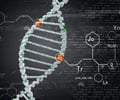New research that has significant implications for prenatal testing for major fetal chromosome abnormalities appears in this week's New England Journal of Medicine.

A team of scientists, led by Diana W. Bianchi, MD, Executive Director of the Mother Infant Research Institute at Floating Hospital for Children at Tufts Medical Center, reports the results of their clinical trial using non-invasive cell-free DNA prenatal testing in a general obstetrical population of pregnant women, in an article entitled "DNA sequencing versus standard prenatal aneuploidy screening."
The multi-center, blinded study analyzed samples from 1,914 pregnant women, and found that noninvasive cfDNA testing had a ten-fold improvement in the positive predictive value for trisomy 21, commonly known as Down syndrome, compared to standard prenatal aneuploidy screening methods (aneuploidy is a term for one or more extra or missing chromosomes). Importantly, the cfDNA test performed consistently well in a general population of pregnant women, regardless of their risk for fetal chromosomal abnormalities. Previous studies have shown that the tests were more accurate for women who had higher risks for fetal chromosomal abnormalities, but this was the first time that the cfDNA tests were compared in a general obstetrical population to the variety of blood and ultrasound tests that comprise the current standard of care in the United States.
"We found that the major advantage of noninvasive prenatal DNA testing was the significant reduction of the false positive rate," said Bianchi. "Prenatal testing using cell-free DNA as a primary screen could eliminate the need for many of the invasive diagnostic procedures (such as amniocentesis) that are performed to confirm a positive screen."
Prenatal screening for fetal aneuploidy is recommended by the American College of Obstetricians and Gynecologists as part of routine prenatal care. Researchers compared current standard noninvasive aneuploidy testing techniques - serum biochemical assays and nuchal translucency measurements using ultrasound - with a noninvasive, cell-free DNA test. Serum biochemical assays identify biomarkers for chromosomal abnormalities while nuchal translucency measurements use ultrasound examinations to measure the thickness of a space at the back of the baby's neck. With Down syndrome, more fluid is present, making the space appear thicker. Cell-free DNA testing works by mapping and counting DNA fragments in a mother's blood sample and comparing the measurements to normal reference samples. The cell-free DNA is obtained through a simple blood draw from the mother after 10 weeks of pregnancy.
The study's endpoint was a comparison of false positive rates for trisomies 21 and 18 between the two methods. The false positive rate for combined trisomies 18 and 21 among those undergoing DNA testing was 0.45 percent while the rate for standard testing was 4.2 percent, a statistically significant difference.
Advertisement
"A strength of our study is that it was conducted in a variety of clinical settings that mirror real-world medical practices," said Bianchi. "The majority of the patients in the study were less than 30 years old, were having their first baby, and conceived spontaneously. Our study population was racially and ethnically diverse, which also makes our results very relevant to actual clinical practice. We also obtained pregnancy outcome information on every patient in the study."
Advertisement
Source-Eurekalert













